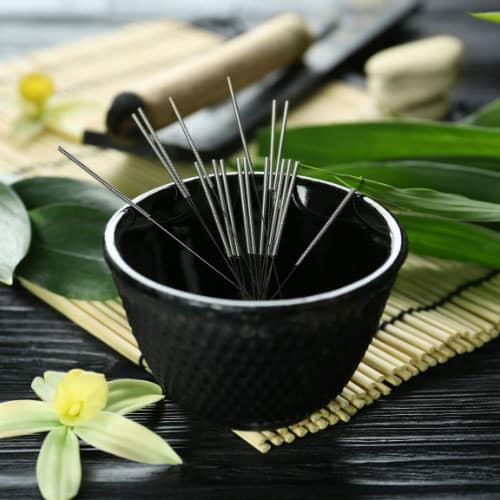Acupuncture for addiction isn’t just a topic of scholarly debate; it’s a beacon of hope and relief for many. At Family Wellness Acupuncture in Irvine, CA, Ryoko Takayama and her dedicated team bear witness to the transformative power this age-old practice can hold for individuals grappling with addiction.
Rooted deeply in the wisdom of Traditional Chinese Medicine, acupuncture is more than mere needlework. It’s about tapping into the body’s intrinsic ability to heal by releasing endorphins—the chemicals that make us feel good—and other beneficial neurotransmitters.
There’s something genuinely hopeful about using such an ancient method to combat contemporary issues like addiction. With its encouraging success in reducing cravings and easing withdrawal symptoms, acupuncture stands as not just an alternative route but possibly a fundamental pillar in conquering addiction struggles.
Let’s delve deeper into understanding how this timeless technique is presenting fresh pathways to recovery for those caught in addiction’s tough grip.
Key Takeaways
- Acupuncture, a traditional Chinese medicine method, helps fight addiction by triggering the body’s healing process. It uses thin needles to stimulate specific points on the body, releasing endorphins and reducing cravings.
- Auricular acupuncture, which places needles in the ear, is particularly effective for opioid addiction. It can lessen cravings and enhance overall well-being.
- Combining acupuncture with other treatments offers a holistic approach to overcoming addiction. It not only tackles physical symptoms but also supports emotional health by reducing stress and improving mood.
- Scientific studies have backed up acupuncture as an effective treatment for opioid addiction, highlighting its role in decreasing anxiety and depression related to drug recovery.
- Non – needle alternatives like vaccaria seeds or magnetic beads provide options for those uncomfortable with traditional needle techniques, making acupuncture accessible to more people seeking help with addictions.
Understanding Acupuncture

Moving forward from the introduction, let’s dive deeper into what acupuncture really means. It’s a traditional form of Chinese medicine—dating back thousands of years—that uses thin needles to stimulate specific points on the body.
These points are gateways to natural healing processes. Through stimulation, acupuncture activates the body’s inherent ability to repair and rejuvenate.
Auricular acupuncture stands out in treating addiction; it involves placing five needles at precise ear points. This method has shown remarkable results in battling opioid addiction by lessening cravings and boosting overall well-being.
With its roots deeply embedded in ancient practices, acupuncture today plays a pivotal role alongside modern medical treatments in addiction recovery strategies. For those exploring non-traditional paths to combat addictions, Family Wellness Acupuncture in Irvine CA, led by Ryoko Takayama, offers tailored sessions that promise a holistic approach towards healing and wellness.
Discover more about their services at fwaacupuncture.com.
The Role of Acupuncture in Addiction Treatment

Acupuncture plays a vital role in addiction treatment, offering a holistic approach to address the physical and emotional aspects of addiction. It works by stimulating specific points on the body to help alleviate withdrawal symptoms, reduce cravings, and restore balance in the mind and body.
How it works
Acupuncture triggers the body to release endorphins—our natural painkillers. This reduces stress and anxiety, setting a foundation for healing addiction. It targets specific points that can influence the mesolimbic dopamine system, crucial in cravings and addiction recovery.
Through needle insertion at these strategic sites, acupuncture stimulates biological responses vital for combating withdrawal symptoms.
Next, we dive into the possible mechanisms behind its effectiveness in treating addictions, deepening our understanding of this therapeutic approach.
Possible Mechanisms for its Effectiveness
Acupuncture activates the body’s natural healing processes by stimulating specific points. This action may trigger the release of endorphins and neurotransmitters. These chemicals play a crucial role in reducing anxiety, depression, and craving for substances such as opioids.
Moreover, acupuncture has been found to improve emotional regulation, ease physical pain, and enhance sleep quality. It directly impacts areas of the brain associated with addiction, potentially offering relief from withdrawal symptoms and decreasing the likelihood of relapse.
Let’s explore how incorporating acupuncture into an addiction recovery plan can offer additional benefits.
Benefits of Acupuncture for Addiction

Acupuncture for addiction offers mood improvement, stress and anxiety reduction, and assistance with withdrawal symptoms. It also enhances the mind-body connection during the recovery process, promoting holistic healing.
Ready to learn more about how acupuncture can support addiction treatment? Find out at fwaacupuncture.com/acupuncture.
Improves Mood and Reduces Stress and Anxiety
We’ve seen firsthand how acupuncture therapy can turn the tide for those battling addiction. It’s not just about easing physical discomfort; it goes deeper, targeting emotional turmoil too.
Stress and anxiety often walk hand-in-hand with drug addiction, making recovery seem like a distant dream. But here’s where acupuncture steps in—stimulating endorphins release. These natural mood lifters play a key role in calming nerves and boosting spirits.
Moreover, patients report feeling less anxious and depressed during their treatment journey, thanks to this ancient practice. It’s like hitting a reset button on your mental health, allowing you to face challenges with clarity and peace of mind.
Reducing stress isn’t just beneficial—it’s crucial for maintaining sobriety and preventing relapse. Through targeted needle placement, we’re helping people struggling with addiction not only fight off cravings but also rediscover joy and tranquility in their lives—a vital step towards lasting recovery.
Eases Withdrawal Symptoms
Acupuncture helps in easing withdrawal symptoms such as cravings, physical pain, and emotional distress. It reduces anxiety, stress, and sleep disturbances commonly experienced during the withdrawal phase of addiction recovery.
The treatment also aids in regulating emotions, promoting relaxation, and improving overall well-being for individuals undergoing addiction rehabilitation. Acupuncture has shown to be effective in alleviating the challenging process of withdrawal from addictive substances by providing relief from physical discomfort and emotional turmoil.
The use of acupuncture as a complementary therapy can significantly contribute to reducing the severity of withdrawal symptoms associated with substance addiction. This alternative treatment approach offers a holistic method for addressing the complex challenges that individuals face during their recovery journey.”.
Enhances Mind-Body Connection
Acupuncture enhances the connection between the mind and body during addiction treatment. It promotes relaxation, inner peace, and a sense of well-being in individuals undergoing recovery.
By soothing withdrawal symptoms, acupuncture contributes to fostering a stronger mind-body bond throughout the healing process.
The therapy’s calming effects on mood, stress, anxiety, and overall psychological well-being play an integral role in connecting the mental and physical aspects of an individual dealing with addiction.
Incorporating Acupuncture into Addiction Recovery Plan

Incorporating acupuncture into addiction recovery plan:
- Find a licensed acupuncturist experienced in treating addiction.
- Combine acupuncture with other treatments for complementary therapy.
- Acupuncture may improve emotional regulation and sleep quality in recovery.
- It has shown promising results in treating opioid addiction.
- Research the effectiveness of acupuncture dates back to the 1970s.
Scientific Studies Supporting Acupuncture for Addiction
Scientific studies have demonstrated that acupuncture shows promise in treating opioid addiction. The therapy has been associated with reducing anxiety and depression in individuals undergoing drug addiction treatment, providing a holistic approach for addressing physical and emotional aspects of addiction recovery.
Acupuncture stimulates the release of endorphins, thereby decreasing stress and anxiety during the recovery process. Combined with other forms of addiction treatment, it offers valuable complementary therapy, making it viable when used alongside other treatments.
Alternatives to Using Needles in Acupuncture
Vaccaria seeds, metal/ceramic beads, and magnetic beads are non-needle alternatives for acupuncture. Acupuncture may not be widely available in all treatment centers; it’s mainly offered at holistic recovery centers.
Family Wellness Acupuncture in Irvine CA, led by Ryoko Takayama, provides these services.
Acupuncture Services for Addiction
Acupuncture services for addiction, such as those offered at Family Wellness Acupuncture in Irvine CA by Ryoko Takayama, can be a valuable addition to an addiction recovery plan. Research shows that acupuncture may help with opioid use disorder, easing physical pain and improving emotional regulation during the recovery process.
It has also been associated with reducing anxiety and depression in patients undergoing drug addiction treatment. Finding a qualified and licensed acupuncturist experienced in treating addiction is crucial for effective results..Consider reaching out to Family Wellness Acupuncture through their website fwaacupuncture.com/contact for more information about their services.
Conclusion
Ready to take charge of your health? Let’s start by exploring the benefits of acupuncture for addiction. Discover how it can ease withdrawal symptoms, enhance your well-being, and complement traditional treatment methods.
Don’t wait to begin your journey toward better health today! Choosing us means we will help you find the healthy results you want.
Book your first appointment with us right now by phone at (949) 836-2857 or online at fwaacupuncture.com
Have a question? Connect with us here: contact@familywellnessacupuncture.com.
FAQs
1. What is acupuncture for addiction?
Acupuncture for addiction uses tiny needles at specific points on the body to help fight opiate, heroin, and other addictions. It’s part of traditional oriental medicine.
2. How does acupuncture work to combat addiction?
The treatment targets areas like the shen men point and liver point, aiming to restore balance, relieve pain, and reduce cravings by affecting neurotransmitter systems.
3. What’s the NADA protocol in acupuncture detoxification?
NADA — short for National Acupuncture Detoxification Association – focuses on five ear points: Shen men, kidney, lung, sympathetic, and liver points. This method supports withdrawal from substances by calming the mind and detoxifying the body.
4. Can acupuncture alone cure my addiction?
No, it’s usually part of a broader approach that might include support groups, medication-assisted treatment and rehab clinics. Think of it as a teammate rather than a solo player.
5. Is there any scientific proof that acupuncture helps with addiction?
Yes! There are randomized control trials showing its effectiveness in reducing cravings and easing withdrawal symptoms — though results can vary based on individual cases.
6. Will I feel relaxed during an acupuncture session?
Most people do! The placement of needles aims not only to treat physical ailments but also promotes feelings of relaxation — it taps into your brain’s chill zones.
